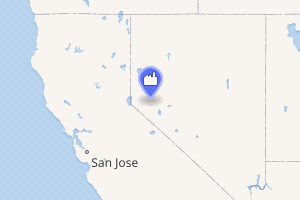Fort Churchill Solar Array
The Fort Churchill Solar Array is a 19.9 megawatt (MWAC) concentrator photovoltaics power station near the city of Yerington in Lyon County, Nevada.[1] It is the largest assembly of SunPower C7 tracker low concentration PV (LCPV) technology in the United States. The facility was constructed for Apple Inc. to service its Reno Technology Park Data Center.[2][3]
| Fort Churchill Solar Array | |
|---|---|

| |
| Country | United States |
| Location | Mason Valley, Yerington, Nevada |
| Coordinates | 39°07′41″N 119°08′24″W |
| Status | Operational |
| Construction began | mid 2014 |
| Commission date | August 2015 |
| Owner(s) | Apple Inc. |
| Operator(s) | NV Energy |
| Solar farm | |
| Type | CPV |
| Site area | 137 acres (55 ha) |
| Power generation | |
| Units operational | 1248 SunPower C7 Gen2 |
| Nameplate capacity | 19.9 MWAC |
| Capacity factor | 20.2% (average 2016-2018) |
| Annual net output | 35.2 GW·h, 257 MW·h/acre |
Project details
The project occupies 137 acres adjacent to NV Energy's 226 MW natural gas-fueled Fort Churchill Generating Station in the Mason Valley.[4] SunPower constructed the project using 1,248 of its second-generation, single-axis C7 tracker systems.[1] The system reflects direct sunlight in order to concentrate it by a factor of seven onto high-efficiency (22.8% at 7x concentration) mono-crystalline silicon solar cells.[5]
Apple initiated the project with Sunpower and NV Energy for the main purpose of supplying its growing data center business in the state with 100% renewable energy.[2] The resulting arrangement is unusual in that Apple owns the facility, leases it to NV Energy to operate and maintain under a 20-year contract, then repurchases the power through the NV GreenEnergy Rider opportunity.[3][6][7]
Electricity production
| Year | Jan | Feb | Mar | Apr | May | Jun | Jul | Aug | Sep | Oct | Nov | Dec | Total |
|---|---|---|---|---|---|---|---|---|---|---|---|---|---|
| 2015 | 1978 | 2179 | 2018 | 1984 | 1830 | 1614 | 1537 | 1262 | 14,400 | ||||
| 2016 | 1309 | 1654 | 2461 | 2595 | 3322 | 3344 | 3764 | 3673 | 3585 | 2974 | 2861 | 2301 | 33,843 |
| 2017 | 1517 | 1686 | 2910 | 3205 | 3586 | 3782 | 3659 | 4021 | 3790 | 3687 | 2402 | 2262 | 36,507 |
| 2018 | 1679 | 2154 | 2758 | 3444 | 3652 | 4265 | 3633 | 3674 | 3534 | 2771 | 2166 | 1677 | 35,407 |
| Average Annual Production for years 2016-2018 ---> | 35,252 | ||||||||||||
LCPV technology commercialization
SunPower's high-efficiency solar cell technology was originally developed to meet the more rigorous demands of LCPV, despite having a much greater success in the flat-panel PV market in the U.S.[5] In late 2011, SunPower announced that its C7 technology could reduce the levelized cost of electricity relative to competing 'utility-scale' PV installations available at the time by 20%.[9]
In a strategic effort to achieve cost reductions at manufacturing scale - reductions similar to those rapidly being realized by commoditized PV using less efficient technology - SunPower entered a joint venture (JV) with the Chinese firm Tianjin Zhonghuan Semiconductor (TZS) to ramp-up LCPV production in late 2012.[10] In early 2014, SunPower announced the supply of 70 MW of "concentrator cell assemblies" to the JV's first 50 MW production line in Inner Mongolia for the first of two projects totaling 120 MW to be completed by the end of 2015.[11]
During the early 2015 completion of its Fort Churchill facility in the U.S., Apple announced its funding of another 40 MW of the JV's LCPV projects in China to support of its growing operations there with renewable energy.[12][13] The JV was reported to have ramped to three 50 MW production lines at that time.[14] Apple, SunPower, and Zhonghuan Energy (TZS's project development entity) indicated later in 2015 their intention to construct and jointly own an additional 170 MW of LCPV projects in northern China.[15][16]
External links
References
- "Fort Churchill Solar Project - Fact Sheet" (PDF). SunPower. Retrieved March 15, 2019.
- "Apple's Newest Data Center near Reno, NV, Will Get Power From the Sun". Solar Reviews. September 30, 2013.
- Katie Fehrenbacher (March 23, 2016). "How Apple's Solar Strategy Evolved". Fortune. Retrieved March 15, 2019.
- "Fort Churchill Generating Station" (PDF). NV Energy. Retrieved March 15, 2019.
- "The State of LCPV Commercialization". SunPower. October 18, 2012.
- "Solar Resources". NV Energy. Retrieved March 14, 2019.
- Rob Sabo (October 31, 2017). "Apples Lyon County Plant Seen as Start of Something Big". Nevada Appeal.
- "Fort Churchill Solar, Monthly". Electricity Data Browser. Energy Information Administration. Retrieved October 31, 2019.
- "SunPower Concentrated Photovoltaic C7 Tracker Delivers Lowest Cost for Utility-Scale Solar Power Plants". SunPower. October 18, 2011.
- "SunPower Signs Joint Venture Agreement in China". PR Newswire. December 3, 2012. Retrieved March 15, 2019.
- Eric Wesoff (March 26, 2014). "SunPower Sells 70 MW in Concentrator Cell Assemblies for Projects in China". greentechmedia.com.
- Eric Wesoff (April 16, 2015). "Apple and SunPower to build 40 MW of PV in China". greentechmedia.com.
- Ucilia Wang (April 16, 2015). "Apple Goes to China to Build Solar Project with SunPower". Forbes.
- "SunPower and Apple Form JV to Run 40 MW of Solar Projects in China". energytrend.com. April 17, 2015.
- "SunPower, Apple to Collaborate on 170 MW of China PV". rechargenews.com. November 19, 2015.
- Jake Richardson (November 30, 2015). "Apple & SunPower Collaborating On 170 MW Solar Power Project In Mongolia". cleantechnica.com. Retrieved March 15, 2019.